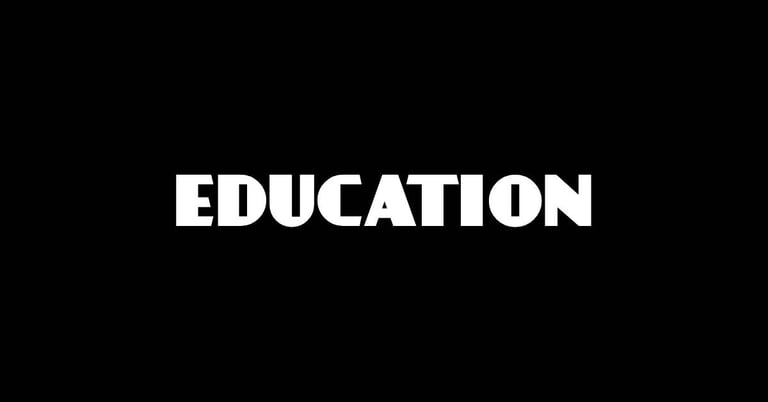11 Facts About Education
Explore unexpected revelations and amazing facts that show how education affects people's lives, communities, and the future in ways you would not would have thought possible.
FACTS ABOUT


Education (Credit: apsce)
Not everyone gets excited when they hear the term education. A lot of people associate it with hard desks, lengthy lectures, and learning knowledge that was quickly forgotten soon after the exam was over. However, education is much more interesting than many individuals understand and encompasses much more than what occurs in a classroom setting. Education is natural, strange, and amazing, from Vikings sharing stories to donkeys transporting books in Colombia, from old universities in Morocco to floating classrooms in Bangladesh. Since learning is more than simply textbooks and exams, these 11 facts may help you reconsider how you approach it. It is with regard to society, inventiveness, and hunger for knowledge.
Education Helps Increase Brain's Gray Matter: Indeed, it is. According to science, education truly changes the structure of your brain. Research indicates that education enhances gray matter, which is involved in memory, emotions, self-control, and decision-making. It is comparable to mental gymnastics. Your brain gets stronger, gets rewired, and gets more effective at reasoning each moment you study anything unfamiliar. In the most ideal practical approach, learning did, in fact, make your brain suffer if you have previously experienced it.
Education in Morocco Began Over 1,000 Years Ago: Ignore Harvard or Oxford. Established in 859 AD, the University of al-Qarawiyyin in Fez, Morocco, continues to operate today. That is more than a millennium of lifelong education. It was founded by a woman, Fatima al-Fihri, and demonstrates the length of time societies have known about the importance of transitioning information from one lineage to the other.
Education Through Teaching Others Improves Memory Retention: This could be the reason why your learning buddy consistently scores high on tests. Educating individuals strengthens your own understanding, this phenomenon is known as the protégé effect. Therefore, consider explaining a topic aloud to another individual (or maybe your pet) if you have trouble understanding it. It works out.
Education in Finland Does Not Begin Formal Grading Until Age 10: Finland places more emphasis on playtime, interactions with others, and emotional growth than it does on grades from a young age. The concept? Letting kids be kids. Prior to official examinations being implemented, give children time to experiment, collaborate, and gain self-confidence. The catch is that Finland's educational system is regularly rated as one of the finest in the world.
Education Without Sleep is Far Less Effective: While staying up late to study for tests may seem beneficial, it is actually causing greater damage than benefit. Why? Due to the fact that your brain brings together thoughts during REM sleep. Lack of sleep causes forgetfulness and an unclear head. Go to bed and put the book away if you would like to remember the information you are studying.
Education in Colombia Reaches Remote Areas by Donkey: Education in rural Colombia is a four-legged affair. The "Biblioburro" initiative provides youngsters in remote areas with the opportunity for learning resources they would not normally have by packing donkeys with books. Although it is hoof by hoof, it is one of the greatest inventive, and touching, examples of how education can spread.
Education Can Happen Without Walls: Even though Bangladesh experiences severe floods every year, schooling continues. To get to learners, floating schools, yes, actual schools on boats, cross floodwaters. These boat schools have computers, solar panels, and professional educators. It serves as an encouragement that despite the absence of roads, a will to acquire knowledge may triumph.
Education Through Doodling Can Improve Concentration: Doodling is not always a distracting activity, despite what your teacher may have suggested. It could enhance students' ability to focus and remember knowledge. What separates focusing in and focusing out might just be a little sketch in the far end of your notes.
Education Can Grow Through Storytelling: Traditions used narratives to teach way before there were books or whiteboards. Oral tradition was used by Vikings, Native American tribes, and multiple pre-historic cultures for passing along information, abilities, and beliefs. These were imaginatively enriched education rather than bedtime stories. You now understand the reason a narrative can teach you far beyond a PowerPoint.
Education in Italy’s Reggio Emilia Schools Follows The Child’s Curiosity: Instead of following a strict educational program, Reggio Emilia schools allow students' hobbies to influence their learning. Do you want to investigate shadows? You are going to learn history, mathematics, and illumination. Do you want to construct a particular thing? You are going to apply innovative thinking, problem-solving, and collaboration. It is education that develops as the student does.
Education Improves With Spaced Repetition: There is an alternative strategy if you are one of those people that study everything during the evening prior to a test (guilty). Learning in shorter periods throughout time, or spaced repetition, significantly assists in the retention of knowledge in your long-term memory. It is similar to watering a plant gradually over several days as opposed to pouring a bucket at one go.
Summary: Education is All Over...You Simply Need to Notice It
The truth is that education is not restricted to a particular style of thought, a course of study, or a classroom. It is in the narratives we share, the books we read together, the sleep we value, and the lessons we pass to individuals. You are developing your mind whether you are educating your younger sister about fractions, studying through recreation, or riding a donkey. Perhaps it is time to take a fresh approach to education if it seems dull or remote. As a result, education is significantly more imaginative, adaptable, and motivating than majority of individuals are aware of, as the above 11 facts demonstrate. After all, something that strengthens your brain and provides a reason to take a moment to rest? That is something to be mindful of.
